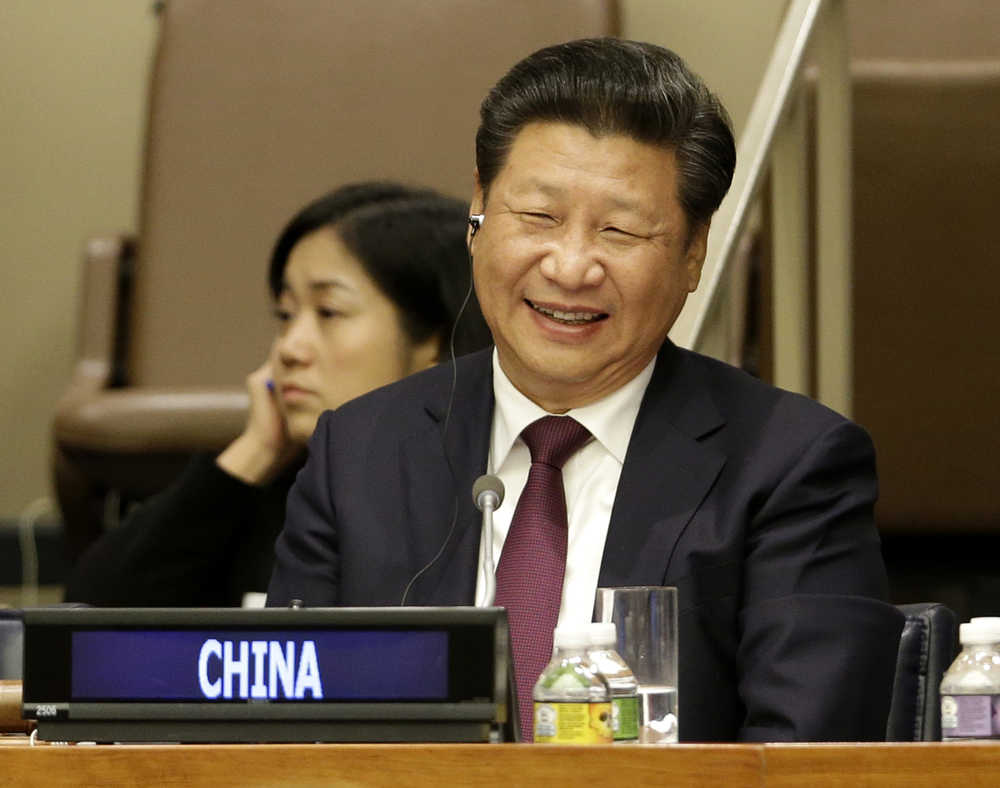UNITED NATIONS — World leaders pledged money and political clout to achieve equality for women by 2030 at a U.N. meeting Sunday co-chaired by China’s President Xi Jinping, who has faced strong criticism for cracking down on women’s rights activists.
Among the Chinese leader’s strongest critics was Democratic presidential candidate Hillary Clinton who tweeted: “Xi hosting a meeting on women’s rights at the UN while persecuting feminists? Shameless.”
Leaders from about 80 countries and dozens of diplomats attended the meeting to mark the 20th anniversary of the U.N. women’s conference in Beijing and press for implementation of its 150-page action plan for gender equality — which remains one of the 17 new development goals adopted by world leaders on Friday.
As U.S. first lady, Clinton galvanized the 1995 Beijing conference with a rousing speech that included words that have become a mantra for the global women’s movement: “human rights are women’s rights — and women’s rights are human rights.”
Xi partly echoed her words, telling Sunday’s meeting that “women’s rights and interests are basic human rights. They must be protected by laws and regulations.”
But he did not mention any of the women activists targeted by the Chinese government, women such as 71-year-old journalist Gao Yu, arrested in 2014 and sentenced to seven years in prison on charges of “leaking state secrets overseas,” or human rights lawyer Wang Yu, a campaigner against sexual harassment of school girls and defender of women’s rights activists who was arrested in July and is being held at a secret location on suspicion of “inciting subversion of state power.”
Nor did he mention the five women who spent 37 days in detention this year because they planned to advocate against sexual harassment on public transportation. In a letter Thursday to Secretary-General Ban Ki-moon and UN Women, the “China Feminist Five” expressed hope that Xi would announce concrete plans and measurements to promote gender equality and women’s empowerment, and that their wrongful cases would be dropped soon. He did not.
Xi did draw loud applause when he announced a $10 million donation to UN Women, the agency promoting women’s rights, to accelerate implementation of the Beijing platform — and again when he announced that in the next five years China will help developing countries produce 100 “health projects” for women and children, finance 100 programs to send poor girls to school, train 30,000 women from developing countries in China, and provide training opportunities for 100,000 women in other developing countries.
U.S. Ambassador Samantha Power attended the meeting after putting up the 20th photo in the window of the U.S. Mission across the street from U.N. headquarters of a woman rights activist who should have been at Sunday’s meeting instead of in jail. The photos include China’s Gao, Wang, and Liu Xia who has been under house arrest since the October 2010 announcement that her husband, Liu Xiaobo, received the Nobel Peace Prize.
While progress on women’s rights over the past 20 years has been striking, Power said at the photo ceremony that “many governments continue to suppress women’s basic rights — including by locking them up for speaking out about injustice and fundamental freedoms.”
Switzerland exceeded China’s donation to UN Women. President Simonetta Sommaruga said it will increase its contribution to almost $50 million for the 2015 to 2017 period, but most other commitments from more than 45 countries were in promised actions rather than money.
Afghanistan’s Chief Executive Abdullah Abdullah pledged to “spare no effort” to implement a law ending violence against women. Austrian President Heinz Fischer made a commitment “to further tackling gender stereotyping.”
German Chancellor Angela Merkel said her government will launch an initiative to improve the professional qualifications of women in developing countries and promote “the entrepreneurial power of women.”
Mozambique’s President Filipe Jacinto Nyusi committed “to combatting harmful gender practices that violate human rights since as early marriage, sexual abuse and trafficking of children.”
Liberia’s President Ellen Johnson Sirleaf told the meeting that “for women and girls throughout the world, my election is commitment to women’s equality.” But she said much more remains to be done including ensuring that a bill to prevent domestic violence is passed by the legislature.

